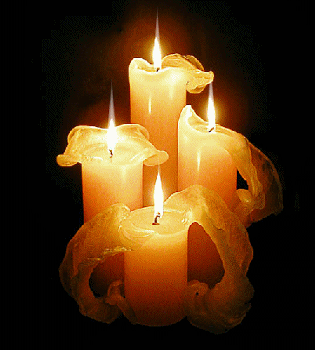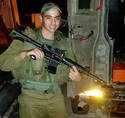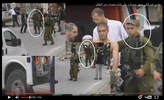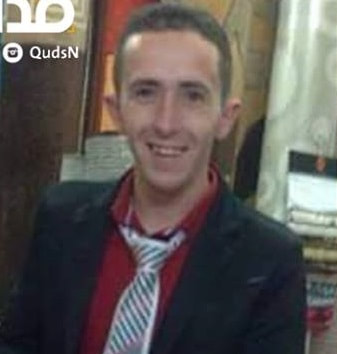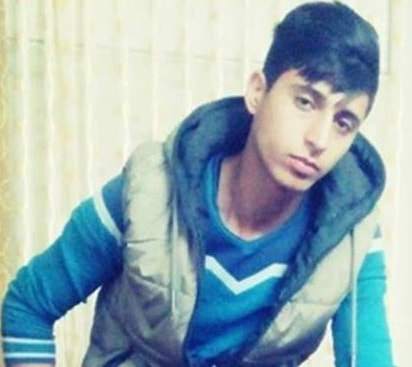26 mar 2016
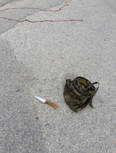
The used knife (no blood on it)
Military officials say soldier could have taken other action before shooting neutralized stabber to death - like warn the other troops to back away - but did not; 'The IDF has nothing against him. This is an unusual and grave case that must be investigated,' they say.
A junior officer had checked the terrorist in Hebron and ensured he was not carrying explosives before an IDF soldier shot the neutralized attacker to death, senior IDF officials said Saturday evening.
The Palestinian attacker, Abed al Fatah a-Sharif, along with another attacker, stabbed an IDF soldier. Both were then gunned down by other soldiers.
A video filmed by a B'Tselem volunteer several minutes later shows the wounded a-Sharif lying on the ground motionless as an IDF soldier aims his weapon at him and shoots him in the head.
The IDF suspended and then arrested the soldier on suspicion of murder, and the military’s Criminal Investigation Division (CID) has already launched an investigation into the incident.
The soldier’s lawyer said his client saw a-Sharif moving and feared he was going to detonate a bomb, leading him to shoot the neutralized attacker.
A second video from the incident shows the terrorist moving before being shot, while a third video of the evacuation of the wounded soldier reveals dialogue between the rescue team members and the soldiers around them, with an authoritative figure saying, "He probably has an explosive on him, pay attention. Until the bomb squad comes, nobody touches him." The CID is investigating whether the warning was made by an IDF soldier of commander, or by a civilian paramedic.
When questioned by the CID, the soldier claimed that there have been warnings over the past three weeks of a Hamas cell planning a combined terror attack in Hebron that would include both shooting and explosives. The CID said Friday it has yet to check the validity of his claim. His remand has been extended until Tuesday.
The CID is also planning to gather testimony from Palestinians who were at the scene of the attack, after already having spoken to officers and soldiers who were there.
The investigation of the incident has found that one of the junior officers on the scene did check the terrorist for explosives after he was shot down and neutralized.
The soldier who later shot the terrorist to death, however, was not at the scene of the attack when that check was conducted, and was not aware of the fact the officer "cleared" the terrorist of carrying explosives.
The soldier arrived at the scene about two minutes after the attack as reinforcement, and then shot the terrorist who was lying on the ground - of his own accord.
"The procedure for a situation in which there's suspicion the terrorist has an explosive belt on is clear and known, and includes telling the other troops to back away and be careful, something the soldier did not do," an IDF official said on Saturday evening.
"If he suspected the terrorist was carrying explosives, he could've taken several actions before shooting the terrorist."
The officials responded to criticism from the soldier's family, who claimed the military had abandoned him. "He is an IDF soldier and the military has nothing against him. This is an unusual and grave case that must be investigated."
IDF Chief of Staff Gadi Eisenkot was briefed on the investigation's progress and praised the soldiers who stopped the attack and their professional conduct. He noted that the IDF was waging a determined and professional fight against terrorism and that the results of this fight can be felt on the ground. He added that the IDF will back soldiers and commanders who committed mistakes, but not when their behavior is not in line with the military's values.
Eisenkot's comments caused outrage, and posters were put up near the Kirya military headquarters in Tel Aviv depicting him as Haman the evil and calling on his to resign.
Sources in the IDF condemned the posters, saying they are "inciting and dangerous."
Military officials say soldier could have taken other action before shooting neutralized stabber to death - like warn the other troops to back away - but did not; 'The IDF has nothing against him. This is an unusual and grave case that must be investigated,' they say.
A junior officer had checked the terrorist in Hebron and ensured he was not carrying explosives before an IDF soldier shot the neutralized attacker to death, senior IDF officials said Saturday evening.
The Palestinian attacker, Abed al Fatah a-Sharif, along with another attacker, stabbed an IDF soldier. Both were then gunned down by other soldiers.
A video filmed by a B'Tselem volunteer several minutes later shows the wounded a-Sharif lying on the ground motionless as an IDF soldier aims his weapon at him and shoots him in the head.
The IDF suspended and then arrested the soldier on suspicion of murder, and the military’s Criminal Investigation Division (CID) has already launched an investigation into the incident.
The soldier’s lawyer said his client saw a-Sharif moving and feared he was going to detonate a bomb, leading him to shoot the neutralized attacker.
A second video from the incident shows the terrorist moving before being shot, while a third video of the evacuation of the wounded soldier reveals dialogue between the rescue team members and the soldiers around them, with an authoritative figure saying, "He probably has an explosive on him, pay attention. Until the bomb squad comes, nobody touches him." The CID is investigating whether the warning was made by an IDF soldier of commander, or by a civilian paramedic.
When questioned by the CID, the soldier claimed that there have been warnings over the past three weeks of a Hamas cell planning a combined terror attack in Hebron that would include both shooting and explosives. The CID said Friday it has yet to check the validity of his claim. His remand has been extended until Tuesday.
The CID is also planning to gather testimony from Palestinians who were at the scene of the attack, after already having spoken to officers and soldiers who were there.
The investigation of the incident has found that one of the junior officers on the scene did check the terrorist for explosives after he was shot down and neutralized.
The soldier who later shot the terrorist to death, however, was not at the scene of the attack when that check was conducted, and was not aware of the fact the officer "cleared" the terrorist of carrying explosives.
The soldier arrived at the scene about two minutes after the attack as reinforcement, and then shot the terrorist who was lying on the ground - of his own accord.
"The procedure for a situation in which there's suspicion the terrorist has an explosive belt on is clear and known, and includes telling the other troops to back away and be careful, something the soldier did not do," an IDF official said on Saturday evening.
"If he suspected the terrorist was carrying explosives, he could've taken several actions before shooting the terrorist."
The officials responded to criticism from the soldier's family, who claimed the military had abandoned him. "He is an IDF soldier and the military has nothing against him. This is an unusual and grave case that must be investigated."
IDF Chief of Staff Gadi Eisenkot was briefed on the investigation's progress and praised the soldiers who stopped the attack and their professional conduct. He noted that the IDF was waging a determined and professional fight against terrorism and that the results of this fight can be felt on the ground. He added that the IDF will back soldiers and commanders who committed mistakes, but not when their behavior is not in line with the military's values.
Eisenkot's comments caused outrage, and posters were put up near the Kirya military headquarters in Tel Aviv depicting him as Haman the evil and calling on his to resign.
Sources in the IDF condemned the posters, saying they are "inciting and dangerous."
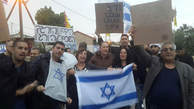
Family of soldier hold press conference, with sister urging IDF chief and spokesperson not to court-martial him in the media, and lamenting the fact her brother became 'an enemy of the state' in the eyes of the state's leadership.
About 200 Israelis protested on Saturday night in solidarity with an IDF soldier who was arrested on suspicion of murder after shooting to death a neutralized terrorist in Hebron.
About a hundred people demonstrated outside the Camp Natan IDF base in Be'er Sheva, and about a hundred more protested outside Prison Four (Confinement Base 394) in Tzrifin.
The protesters in Be'er Sheva held up signs saying "kill or be killed" and "Eisenkot, we need an Israeli military chief, not a Belgian one."
Signs outside Prison Four said: "You don't abandon a soldier in the field" and "A dead terrorist is better than a soldier in jail."
Protesters also waved Israeli flags.
About 200 Israelis protested on Saturday night in solidarity with an IDF soldier who was arrested on suspicion of murder after shooting to death a neutralized terrorist in Hebron.
About a hundred people demonstrated outside the Camp Natan IDF base in Be'er Sheva, and about a hundred more protested outside Prison Four (Confinement Base 394) in Tzrifin.
The protesters in Be'er Sheva held up signs saying "kill or be killed" and "Eisenkot, we need an Israeli military chief, not a Belgian one."
Signs outside Prison Four said: "You don't abandon a soldier in the field" and "A dead terrorist is better than a soldier in jail."
Protesters also waved Israeli flags.
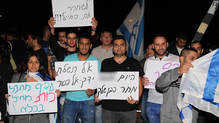
Meanwhile, the soldier's family held a press conference outside their home.
"I stand before and begging you - stop for a moment. I'm begging the IDF chief and IDF spokesperson - why are you giving him a court-martial in the media?" the soldier's sister said, choking back tears. "Why are you killing him without a trial?"
The sister asserted that the IDF did not let her brother explain his actions. "Why didn't you give him a minute to explain what he was going through, what he was feeling, was he worried the heinous terrorist was planning on blowing himself up, or perhaps draw a weapon?" she wondered.
"I stand before and begging you - stop for a moment. I'm begging the IDF chief and IDF spokesperson - why are you giving him a court-martial in the media?" the soldier's sister said, choking back tears. "Why are you killing him without a trial?"
The sister asserted that the IDF did not let her brother explain his actions. "Why didn't you give him a minute to explain what he was going through, what he was feeling, was he worried the heinous terrorist was planning on blowing himself up, or perhaps draw a weapon?" she wondered.
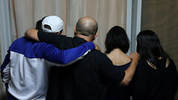
The soldier's family hold press conference
"Over the past two days, we've been hearing the heads of the military, who can speak to any member of the press, giving my brother a court-martial in the media, while he can't defend himself," the sister continued.
"The B'Tselem NGO released a video that presents a one-sided version of the incident, and since then we've heard the leadership judging him, sentencing him and all that's left now is to execute him, without allowing him to defend himself."
She went on to lament the fact her brother had become "an enemy of the state in the eyes of B'Tselem, the chief of staff, and the IDF spokesperson," accusing them of "lynching him live on TV. You are each, separately, much stronger than he is and together you are all like a steamroller that turned my brother into dust."
The sister also bemoaned the fact the media has been "harshly criticizing and vilifying him."
"Over the past two days, we've been hearing the heads of the military, who can speak to any member of the press, giving my brother a court-martial in the media, while he can't defend himself," the sister continued.
"The B'Tselem NGO released a video that presents a one-sided version of the incident, and since then we've heard the leadership judging him, sentencing him and all that's left now is to execute him, without allowing him to defend himself."
She went on to lament the fact her brother had become "an enemy of the state in the eyes of B'Tselem, the chief of staff, and the IDF spokesperson," accusing them of "lynching him live on TV. You are each, separately, much stronger than he is and together you are all like a steamroller that turned my brother into dust."
The sister also bemoaned the fact the media has been "harshly criticizing and vilifying him."
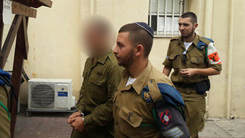
She urged the IDF chief, the IDF spokesperson, the defense minister and the prime minister to stop and consider "what would a soldier think tomorrow if he sees a terrorist lying on the ground and fear he might have an explosive belt on? Today it's my brother, and tomorrow it'll be the new recruits, who will be torn by the dilemma."
Asking for "understanding and compassion" for her brother, the sister described him as "a dedicated soldier, a patriot who loves the State of Israel, is disciplined, and brave."
Earlier Saturday, the sister wrote a post on Facebok harshly criticizing Defense Minister Moshe Ya'alon and the IDF. "My little brother shot a terrorist who came with a knife to murder IDF soldiers in Hebron, and all of a sudden he's suspected of murder. Meaning, the system is accusing my brother the soldier of the murder of a terrorist who came to commit murder. I'm not sure you're realizing how absurd that is," she wrote.
She noted her brother did not expect praise for killing the terrorist, and only wants a fair trial. "We feel like the knife dropped by the terrorist in Hebron was used by the system to stab my little brother in the back," he said.
IDF Chief of Staff Gadi Eisenkot was briefed on the investigation's progress and praised the soldiers who stopped the attack and their professional conduct. He noted that the IDF was waging a determined and professional fight against terrorism and that the results of this fight can be felt on the ground. He added that the IDF will back soldiers and commanders who committed mistakes, but not when their behavior is not in line with the military's values.
Asking for "understanding and compassion" for her brother, the sister described him as "a dedicated soldier, a patriot who loves the State of Israel, is disciplined, and brave."
Earlier Saturday, the sister wrote a post on Facebok harshly criticizing Defense Minister Moshe Ya'alon and the IDF. "My little brother shot a terrorist who came with a knife to murder IDF soldiers in Hebron, and all of a sudden he's suspected of murder. Meaning, the system is accusing my brother the soldier of the murder of a terrorist who came to commit murder. I'm not sure you're realizing how absurd that is," she wrote.
She noted her brother did not expect praise for killing the terrorist, and only wants a fair trial. "We feel like the knife dropped by the terrorist in Hebron was used by the system to stab my little brother in the back," he said.
IDF Chief of Staff Gadi Eisenkot was briefed on the investigation's progress and praised the soldiers who stopped the attack and their professional conduct. He noted that the IDF was waging a determined and professional fight against terrorism and that the results of this fight can be felt on the ground. He added that the IDF will back soldiers and commanders who committed mistakes, but not when their behavior is not in line with the military's values.
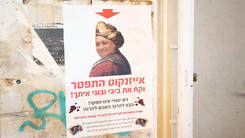
Poster depicting IDF chief as Haman and calling on him to resign
Eisenkot's comments caused outrage, and posters were put up near the Kirya military headquarters in Tel Aviv depicting him as Haman the evil and calling on his to resign.
Sources in the IDF condemned the posters, saying they are "inciting and dangerous."
Meanwhile, Prime Minister Benjamin Netanyahu, who initially determined that "what happened in Hebron does not represent the IDF's values," posted a softer message on his official Facebook page on Saturday night in support of the IDF.
"The attacks on IDF as an immoral army as expressed over the past weekend are outrageous and the opposite of the truth. The IDF is a moral army that does not execute people. IDF soldiers use their bodies to block murderous terrorist attacks on Israeli soldiers, and they are deserving of all our support. Regarding the latest incident—I trust the IDF to perform a thorough, responsible and fair investigation, as it always does."
Eisenkot's comments caused outrage, and posters were put up near the Kirya military headquarters in Tel Aviv depicting him as Haman the evil and calling on his to resign.
Sources in the IDF condemned the posters, saying they are "inciting and dangerous."
Meanwhile, Prime Minister Benjamin Netanyahu, who initially determined that "what happened in Hebron does not represent the IDF's values," posted a softer message on his official Facebook page on Saturday night in support of the IDF.
"The attacks on IDF as an immoral army as expressed over the past weekend are outrageous and the opposite of the truth. The IDF is a moral army that does not execute people. IDF soldiers use their bodies to block murderous terrorist attacks on Israeli soldiers, and they are deserving of all our support. Regarding the latest incident—I trust the IDF to perform a thorough, responsible and fair investigation, as it always does."
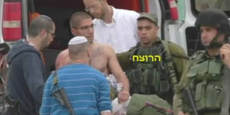
In this image, Azarya is treating the lightly wounded Israeli soldier. His name is written on his gunstrap. His commander, Lt. Col. David Shapira, stands next to him in a black helmet.
On Thursday, a video of a soldier executing an injured Palestinian in Hebron went viral. The Israeli army claimed, according to the PNN, that the soldier was suspended, and an investigation was opened into the case.
The video by B’Tselem rights group showed the soldier, surrounded by others, approaching the Palestinian as he laid wounded on the ground.
One of the settlers said to the soldiers: “This asshole, here, is still breathing.”
According to Tukin Olam blog, a soldier who was a medic in the unit, and who had treated the wounded soldier, asked permission from his commanding officer to “finish off” the wounded Palestinian. Apparently the commander approved.
On Thursday, a video of a soldier executing an injured Palestinian in Hebron went viral. The Israeli army claimed, according to the PNN, that the soldier was suspended, and an investigation was opened into the case.
The video by B’Tselem rights group showed the soldier, surrounded by others, approaching the Palestinian as he laid wounded on the ground.
One of the settlers said to the soldiers: “This asshole, here, is still breathing.”
According to Tukin Olam blog, a soldier who was a medic in the unit, and who had treated the wounded soldier, asked permission from his commanding officer to “finish off” the wounded Palestinian. Apparently the commander approved.
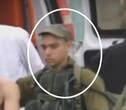
Elor Azraya asked permission from his commanding officer to “finish off” the wounded Palestinian
The soldier walked to within six feet of the wounded Palestinian cocked his rifle and shot him. This practice is often called ‘confirming the kill’ in the IDF. Palestinian girls as young as 12 years-old have been executed in this fashion before.
The execution sparked anger amongst people, as more videos of the execution began to emerge on social media, especially in that many Palestinians are similarly executed by Israeli security forces, but few in as blatant a situation as this, in broad daylight and on camera.
The Tukin Olam website said that, upon wide research, the soldier was identified as El-Or Azarya, a resident of the poor Israeli town of Ramleh, near Tel Aviv.
Other activists in Israel have helped in further identifying him, finding Facebook accounts and photographs which document him before the execution. He is a devoted follower of the Beitar Jerusalem soccer club. The most hardcore racist Beitar fans have formed a gangland-style fan club called La Famigilia.
Among the pages he’s "liked", on Facebook, are the far-right Kahanist, Baruch Marzel; racist rapper, "The Shadow", who advocated burning Palestinians alive on his Facebook page; the La Famiglia page; Justice Minister Ayelet Shaked; and Avigdor Lieberman.
It is highly unlikely that justice will be done, with regard to this incident. Normally, the army claims to investigate such incidents, does so, finds insufficient evidence to prosecute, and closes the case.
The soldier walked to within six feet of the wounded Palestinian cocked his rifle and shot him. This practice is often called ‘confirming the kill’ in the IDF. Palestinian girls as young as 12 years-old have been executed in this fashion before.
The execution sparked anger amongst people, as more videos of the execution began to emerge on social media, especially in that many Palestinians are similarly executed by Israeli security forces, but few in as blatant a situation as this, in broad daylight and on camera.
The Tukin Olam website said that, upon wide research, the soldier was identified as El-Or Azarya, a resident of the poor Israeli town of Ramleh, near Tel Aviv.
Other activists in Israel have helped in further identifying him, finding Facebook accounts and photographs which document him before the execution. He is a devoted follower of the Beitar Jerusalem soccer club. The most hardcore racist Beitar fans have formed a gangland-style fan club called La Famigilia.
Among the pages he’s "liked", on Facebook, are the far-right Kahanist, Baruch Marzel; racist rapper, "The Shadow", who advocated burning Palestinians alive on his Facebook page; the La Famiglia page; Justice Minister Ayelet Shaked; and Avigdor Lieberman.
It is highly unlikely that justice will be done, with regard to this incident. Normally, the army claims to investigate such incidents, does so, finds insufficient evidence to prosecute, and closes the case.
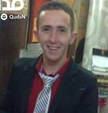
The body of a Palestinian whose brutal killing was caught on film sparking international outcry is still being held by Israeli authorities, with his family demanding a Palestinian coroner partake in the autopsy.
A spokesman for the family of Abed al-Fattah al-Sharif told Ma'an, "we reject the Israeli offer that a Palestinian doctor just be present at the autopsy; we demand that he takes part in the autopsy as well.”
“The family will decide on the legal and medical procedures following the autopsy," he added.
Al-Sharif was shot alongside Ramzi Aziz al-Qasrawi after the two allegedly stabbed and moderately wounded an Israeli soldier at a military checkpoint on Thursday in the Tel Rumeida area of Hebron.
A spokesman for the family of Abed al-Fattah al-Sharif told Ma'an, "we reject the Israeli offer that a Palestinian doctor just be present at the autopsy; we demand that he takes part in the autopsy as well.”
“The family will decide on the legal and medical procedures following the autopsy," he added.
Al-Sharif was shot alongside Ramzi Aziz al-Qasrawi after the two allegedly stabbed and moderately wounded an Israeli soldier at a military checkpoint on Thursday in the Tel Rumeida area of Hebron.
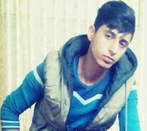
Al-Qasrawi was killed immediately and al-Sharif -- after lying motionless on the pavement for several minutes -- was shot in the head at point-blank range by an Israeli soldier.
Al-Sharif’s body was evacuated shortly after the second shooting and is still being held in Israeli custody.
Graphic footage of al-Sharif’s killing was filmed by a rights worker and resident of the area, which has since gone viral.
The Palestinian who caught the event on film told Ma’an he received threats the following day from Israeli settlers living illegally in the area and said he now feared for his and his family’s safety.
The body of al-Qasrawi was buried in a funeral Saturday attended by hundreds of Palestinians in the Hebron neighborhood of Wadi al-Hariya.
A Palestinian coroner responsible for performing autopsies on the bodies of Palestinians killed by Israeli forces condemned in December the practice by Israeli authorities to demand Palestinian bodies be buried immediately.
Head of Al-Quds University's Institute for Forensic Medicine, Sabir al-Aloul, said Israel’s conditional handover of bodies prevents autopsies from being carried out.
A number of Palestinian families signed a letter in December demanding that families should be allotted time to request an official autopsy report on their dead, which is used in official paperwork necessary to file cases against Israeli authorities at the International Criminal Court.
According to autopsies al-Aloul has performed on Palestinians killed since Oct. 1, the coroner said that those killed were “shot in the head and the chest many times from a very close distance,” similar to incident caught on film Thursday.
Senior PLO official Saeb Erekat urged the international community on March 4 to pressure Israel to release the bodies of Palestinians shot dead by Israeli forces while allegedly carrying out attacks.
He said: "Israel's collective punishments are now being carried out against the living and the dead."
A joint statement released earlier this month by rights groups Addameer and Adalah condemned Israel’s practice of withholding bodies as "a severe violation of international humanitarian law as well as international human rights law, including violations of the right to dignity, freedom of religion, and the right to practice culture."
The statement said it appeared "many" of the Palestinians whose bodies Israel was holding had been "extra-judicially executed by Israeli forces during alleged attacks against Israelis, despite posing no danger."
Al-Qasrawi and al-Sharif were among more than 200 Palestinians to be killed since a wave of unrest swept the occupied Palestinian territory in October.
The majority were killed while carrying out or attempting to carry out small-scale attacks that have left nearly 30 Israelis dead. (FlotillaHyves: 15 killed in whole 2016)
Al-Sharif’s body was evacuated shortly after the second shooting and is still being held in Israeli custody.
Graphic footage of al-Sharif’s killing was filmed by a rights worker and resident of the area, which has since gone viral.
The Palestinian who caught the event on film told Ma’an he received threats the following day from Israeli settlers living illegally in the area and said he now feared for his and his family’s safety.
The body of al-Qasrawi was buried in a funeral Saturday attended by hundreds of Palestinians in the Hebron neighborhood of Wadi al-Hariya.
A Palestinian coroner responsible for performing autopsies on the bodies of Palestinians killed by Israeli forces condemned in December the practice by Israeli authorities to demand Palestinian bodies be buried immediately.
Head of Al-Quds University's Institute for Forensic Medicine, Sabir al-Aloul, said Israel’s conditional handover of bodies prevents autopsies from being carried out.
A number of Palestinian families signed a letter in December demanding that families should be allotted time to request an official autopsy report on their dead, which is used in official paperwork necessary to file cases against Israeli authorities at the International Criminal Court.
According to autopsies al-Aloul has performed on Palestinians killed since Oct. 1, the coroner said that those killed were “shot in the head and the chest many times from a very close distance,” similar to incident caught on film Thursday.
Senior PLO official Saeb Erekat urged the international community on March 4 to pressure Israel to release the bodies of Palestinians shot dead by Israeli forces while allegedly carrying out attacks.
He said: "Israel's collective punishments are now being carried out against the living and the dead."
A joint statement released earlier this month by rights groups Addameer and Adalah condemned Israel’s practice of withholding bodies as "a severe violation of international humanitarian law as well as international human rights law, including violations of the right to dignity, freedom of religion, and the right to practice culture."
The statement said it appeared "many" of the Palestinians whose bodies Israel was holding had been "extra-judicially executed by Israeli forces during alleged attacks against Israelis, despite posing no danger."
Al-Qasrawi and al-Sharif were among more than 200 Palestinians to be killed since a wave of unrest swept the occupied Palestinian territory in October.
The majority were killed while carrying out or attempting to carry out small-scale attacks that have left nearly 30 Israelis dead. (FlotillaHyves: 15 killed in whole 2016)
|
|
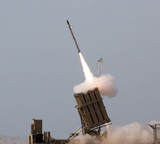
Israel has redeployed the Iron Dome missile interception system in settlements close to the border with the Gaza Strip. Israeli sources said the measure comes in the aftermath of the death of two Palestinians, in Hebron, especially the one who was executed after he was already shot and severely injured.
Israeli TV Channel 2 said that following videotaped execution of the wounded Palestinian, the army deployed Iron Dome systems in Ashdod and Nativot. The extra-judicially executed Palestinian has been identified as Abdul-Fattah Yosri Sharif; another Palestinian, Ramzi Aziz Qasrawi, was shot and instantly killed. The “Jewish Press” agency said the Iron Dome system has been redeployed in many areas, south of the country, especially near Sderot and Nativot, close to the border with the Gaza Strip. It claimed that the motive for the redeployment "remains unclear," especially since Tel Aviv did not reveal whether it was related to a "credible threat," or merely a "routine move." The execution of the Palestinian in Hebron would have gone unnoticed, similar to many previous incidents, but the fact that it was captured on film, and went spiral on the Internet, pushed Israel to, and its Prime Minister, to denounce it. There have been a few instances where similar executions were caught on tape, including the case of Hadeel Wajeeh ‘Awwad, 16, who was executed in occupied Jerusalem, after she was shot and seriously injured, following what appears to be an attempted stabbing attack. Another case was the fatal shooting of Mahdi Mohammad Ramadan al-Mohtasib, 23 years of age, who was shot near the Ibrahimi Mosque in Hebron. Another case is the killing of Mohammad Abu Khalaf, 20, who was first shot by the soldiers in Jerusalem, and fell onto the ground bleeding and incapacitated, when six of the militarized police officers fired more than 50 rounds at him, killing him instantly. Yasmine Rashad Zaro 13
|
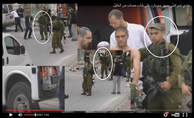
Israeli settlers on Friday gathered outside the home of a human rights worker in Hebron to hurl abuse at him, a day after he captured on camera an Israeli soldier's killing of a wounded Palestinian that has sparked international outcry.
Emad Abu Shamsiya, a staff member with Israeli human rights group B’Tselem, told Ma’an after settlers threatened him: “I now fear for my life and the life of my family. I’m afraid they might attack my house and do me harm.”
He added that he fears the possibility of suffering the same fate as the Dawabsha family, who wasere killed in an arson attack committed by settlers last year in the village of Duma in the occupied West Bank.
Palestinian residents of Hebron Abed al-Fattah Yusri al-Sharif and Ramzi Aziz al-Qasrawi, both 21 years old, were shot down Thursday after allegedly stabbing and moderately wounding an Israeli soldier near a military checkpoint in Hebron’s Old City.
Shamsiya recorded rare video footage of an Israeli soldier shooting al-Sharif in the head at point-blank range in plain view of the medical team after he had already been shot at least once and left motionless on the ground.
The incident has brought a barrage of condemnations from the Israeli leadership and led Israel's army to detain the soldier responsible and launch an investigation.
The release of the graphic video has called attention to what rights groups, international leaders, and Palestinian officials call a policy of "extrajudicial executions" by Israel against Palestinians, since a wave of unrest swept the occupied Palestinian territory and Israel last October.
UN Special Coordinator for the Middle East Peace Process Nickolay Mladenov said Friday he strongly condemned the apparent "extrajudicial execution" of al-Sharif.
"This was a gruesome, immoral, and unjust act that can only fuel more violence and escalate an already volatile situation," Mladenov said.
Tel Rumeida -- where Shamsiya’s house is located and the site of the Thursday’s incident -- has long been a flashpoint for tensions between Palestinians and Israeli settlers and military, and is location to an illegal Israeli settlement.
Mistreatment of Palestinians in the Hebron area has been common since the city was divided in the 1990s after a US-born settler, Baruch Goldstein, massacred 29 Palestinians inside the Ibrahimi Mosque.
The majority of the city was placed under the jurisdiction of the Palestinian Authority, while the Old City and surrounding areas were placed under Israeli military control in a sector known as H2.
The area is home to 30,000 Palestinians and around 800 Israeli settlers who live under the protection of Israeli forces. Hebron residents frequently report attacks and harassment by the settlers carried out in the presence of the forces.
Emad Abu Shamsiya, a staff member with Israeli human rights group B’Tselem, told Ma’an after settlers threatened him: “I now fear for my life and the life of my family. I’m afraid they might attack my house and do me harm.”
He added that he fears the possibility of suffering the same fate as the Dawabsha family, who wasere killed in an arson attack committed by settlers last year in the village of Duma in the occupied West Bank.
Palestinian residents of Hebron Abed al-Fattah Yusri al-Sharif and Ramzi Aziz al-Qasrawi, both 21 years old, were shot down Thursday after allegedly stabbing and moderately wounding an Israeli soldier near a military checkpoint in Hebron’s Old City.
Shamsiya recorded rare video footage of an Israeli soldier shooting al-Sharif in the head at point-blank range in plain view of the medical team after he had already been shot at least once and left motionless on the ground.
The incident has brought a barrage of condemnations from the Israeli leadership and led Israel's army to detain the soldier responsible and launch an investigation.
The release of the graphic video has called attention to what rights groups, international leaders, and Palestinian officials call a policy of "extrajudicial executions" by Israel against Palestinians, since a wave of unrest swept the occupied Palestinian territory and Israel last October.
UN Special Coordinator for the Middle East Peace Process Nickolay Mladenov said Friday he strongly condemned the apparent "extrajudicial execution" of al-Sharif.
"This was a gruesome, immoral, and unjust act that can only fuel more violence and escalate an already volatile situation," Mladenov said.
Tel Rumeida -- where Shamsiya’s house is located and the site of the Thursday’s incident -- has long been a flashpoint for tensions between Palestinians and Israeli settlers and military, and is location to an illegal Israeli settlement.
Mistreatment of Palestinians in the Hebron area has been common since the city was divided in the 1990s after a US-born settler, Baruch Goldstein, massacred 29 Palestinians inside the Ibrahimi Mosque.
The majority of the city was placed under the jurisdiction of the Palestinian Authority, while the Old City and surrounding areas were placed under Israeli military control in a sector known as H2.
The area is home to 30,000 Palestinians and around 800 Israeli settlers who live under the protection of Israeli forces. Hebron residents frequently report attacks and harassment by the settlers carried out in the presence of the forces.
